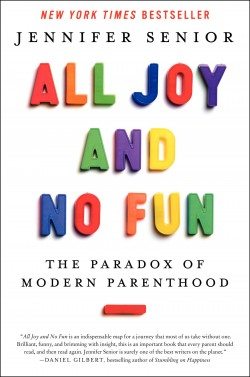
Alpha Mom Book Club: All Joy and No Fun

Newflash: Having kids is tough. The sleepless nights compromise a new parent’s sanity, leaving the poor sap to operate with similar capacity as a drunk driver, parents report lower levels of happiness and satisfaction than non-parents; they have more frustration, face economic stress (Senior cites a report indicating in all 50 states it cost parents more to put two kids in daycare than it did to pay their rent), ranking take care of their children low on the list of activities that give them pleasure (one study of women in Texas ranked child care behind watching TV and housework). Oh, and the monotony and repetition of childcare translates to boredom. After all, there are only so many My Little Pony skits a parent could participate in before wondering if her kid had a career in CIA enhanced interrogation technique development.

And yet, despite all this, people continue to procreate. I assume, at least in part, because they haven’t read this book.
Oh, I know it doesn’t work that way. And I bet most parents, even those scoring “Dear Lord, just let my toddler nap!” on the questionnaires have an unquantifiable love and bond with their child. One of my favorite takeaways from Senior is something she credits to sociologist Viviana Zelizer—“the modern child [is] “economically worthless but emotionally priceless.”
So it makes sense. We love our kids, we want what’s best for them, so we face the economic and emotional doom and gloom head on. Because when you love someone, you don’t really have a choice.
By coincidence, I started reading Senior’s book just as I finished Nora Ephron’s essay “Parenting in Three Stages” in the I Feel Bad About My Neck collection. In my view, Ephron can do no wrong, but when she states “when I gave birth to my children, which was not that long ago, there was almost no such thing as parenting as we know it today” she very correctly identifies a cultural shift from “just” being a mom or a dad to something quasi-professional that requires a gerund. It was a simpler time, she argues and she is convincing that parenting advances haven’t moved the pawn very far along the board. Ephron observes that even though parenthood has been elevated to a sacrament; the results are the same. Kids will be kids, regardless of how hard we parent. They turn out the same, so we sort of need not bother.
It’s a writ large sentiment, but there’s something to it.
In All Joy and No Fun, Senior reminds us that modern parenting is a relatively new concept. Gone are the days when children contributed financially to their family’s households. The days of children being considered precious, dating only to the 19th century, are here to stay. Parents are expected to entertain children now, to play with them; rather than send them away like in the good old days to find their own playthings. “The moment children stopped working for adults, everyone became confused about who was in charge,” Senior claims and witnessing any number of playground and even dinner table encounters, it’s hard to dispute.
And that’s before they get to adolescence. The term “teenager” is a relatively new construct as well, Senior explains, appearing first in the 1940s. The modern teenager is both dependent on the parents and rebellious, a frightening combination. Marriages and relationships falter during a child’s adolescence. Parents are brought to their knees.
The news isn’t better on the domestic division of labor, either. Fathers are definitely more involved, but there seems to be no model for the level of involvement. All the couples that Senior observes and interviews are likable, but I was ready to get on bended knee and propose to Clint. Both he and Angie work and they relieve each other with childcare. Whereas Angie has the familiar ache of feeling guilty for the time that she is at work, and therefore she actively parents when she’s with her kids; Clint has a more laid back approach. He is present and his kids are safe in his care, but he has no issues letting them watch TV. He does not have to parent every minute, he can let the kids be. Would Angie be judged if she did that? Or is that judgment internalized?
All Joy and No Fun provides a sweeping look at a multitude of studies on all aspects of parenting but the most interesting observation, for me, came from a British psychoanalyst Adam Phillips: that it is unrealistic for parents to expect their children to be happy. Even if they pour everything into them, time, money, effort. Phillips writes: “happiness is not something one can ask of a child. Children, I think, suffer- in a way that adults don’t always realize- under the pressure their parents put on them to be happy, which is the pressure not to make their parents unhappy, or more unhappy than they already are.”
Which is significant. Do we parent the way we do because we want to achieve a specific goal? Most parents want their children to have opportunities they never had and to be happier. To achieve this goal, to ensure their children’s happiness, they will forego their own, which has the unfortunate effect of hoping that the children will be happy enough for all of them. The parents’ interpersonal relationships suffer, they are stretched financially, they try to shelter their kids from as much of the unpleasant stuff as they can, they are at their children’s service. This does not make the parents happy but the realization that it puts undue pressure on their children needs to be examined.
But what of the joy of parenthood? There is joy in seeing our children just be, practice their violin, interact with each other, the passive moments during which we do not actively parent. Having children is not all happiness, but it captures one of the emotions that makes us feel “transcendentally human.”
Some of the joy in parenting is the connection that we feel to our children. That connection is part of the reason why statistically parents are less likely statistically to commit suicide than non-parents. Senior quotes Robin Simon: “parents have ties that bind; earthly reasons to keep going.”
“Kids may complicate our lives,” Senior observes, “But they also make them simpler. Children’s needs are so overwhelming, and their dependence on us so absolute, that it’s impossible to misread our moral obligation to them…There’s something deeply satisfying about that.”
I, for one, am no longer worried about the continuation of the species.
Questions for discussion:
- What aspects of All Joy and No Fun rang particularly true for you? Was there anything that seemed inapplicable to your own life and parenting methods?
- Have we as a society done a disservice to children by taking away the demand that they work and contribute to the family economic unit?
- Are children aware of the power that they wield within the family unit? Is this a positive or a negative development?
- What do you think is the future of parenting? Will the pendulum swing the other way and will parents become more laid back, practicing benign neglect and expecting more of their children? Or will the hands-on, child-centric parenting model here to stay?
************
Please join us in June when we discuss Malcolm Gladwell’s David and Goliath: Underdogs, Misfits, and the Art of Battling Giants.

